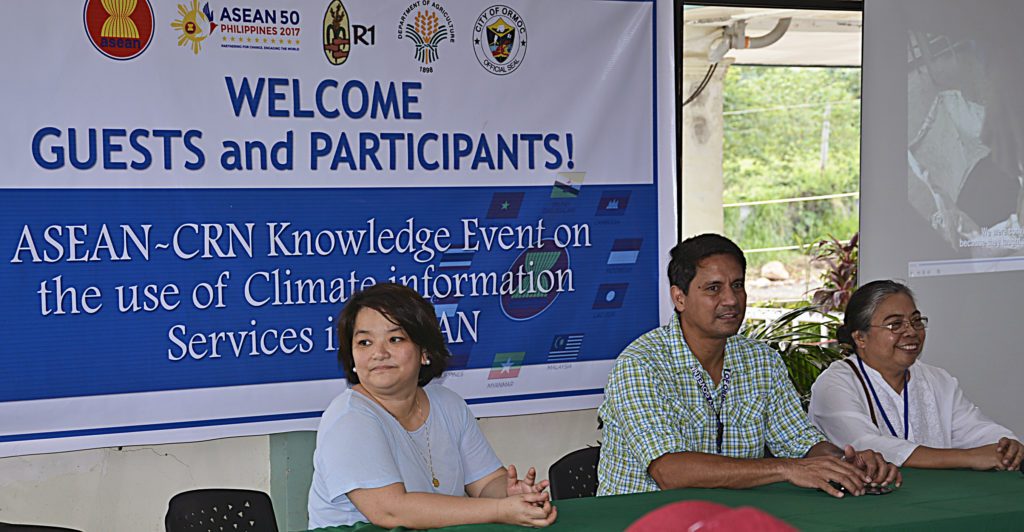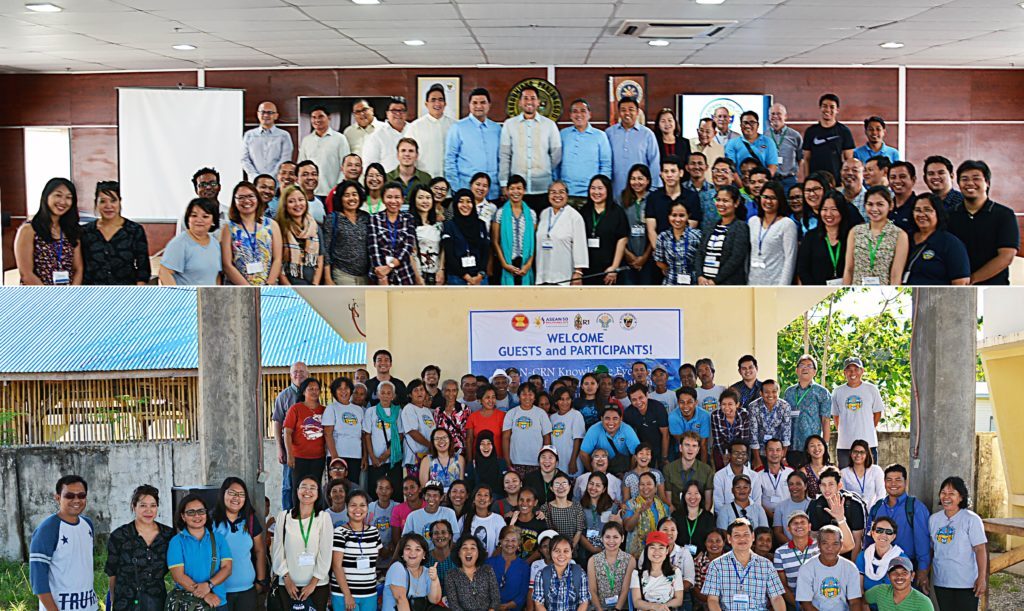Cebu, PHILIPPINES – Representatives of ASEAN Member States (AMS) have gathered on 21–23 March 2017 in Cebu, Philippines to share their experiences on the provision of climate information services (CIS) in their respective countries, and generate actionable learnings and regional collaboration on its effective use in ASEAN agriculture.

“CIS is vital to the agriculture and fisheries sector – when to plant, what to plant, what management practices to adopt, when to market and when to go out to sea, are basic decision-making points that rely on accurate climate information. Translating such information into easily-understandable advisories will guide farmers and fisherfolks – localized climate information is a necessity”, said Mr. Lerey Panes, Assistant Secretary of the Philippine Department of Agriculture and ASEAN Senior Officials Meeting Leader. Moreover, Dr. Margaret Yoovatana, Senior Policy and Planning Specialist of the Thailand Department of Agriculture, explained “This CIS event is a venue to bring together policymakers, scientists, practitioners, and the private sector to strengthen their capacities in mobilizing concerted efforts, and be engaged in the development and delivery of CIS for agriculture in the ASEAN region. We hope that this knowledge exchange event could identify policy interventions and institutional frameworks for increasing investment, technologies and management systems to support CIS for agriculture as well as activities for regional collaboration in ASEAN.”

In dynamic marketplace sessions, existing programmes and experiences on CIS in ASEAN Member states were shared and discussed. The sessions focused on CIS for agricultural productivity, for market access and financial inclusion, as for risk management and gender inclusion. Each market place was complemented by presentations from technical experts and partners from the region.
But having the right technical solutions available is often not enough for their sector wide application in agriculture. To ensure that CIS can be scaled-up and applied widely along all stages in agricultural value chains, they need to be mainstreamed in the institutional and political frameworks of ASEAN Member States. The National Adaptation Plan (NAP) process is a means to identify strategies to adapt to the impacts of climate change and can provide a framework for the planning and provision of CIS in agriculture. Representatives from the Philippines, Thailand and Vietnam shared their experiences on how the institutional arrangements for CIS and how they are promoted in the NAP process.
The technical sessions served as inputs for a series of interactive groupworks to develop actionable country plans for improving the generation and provision of CIS for agriculture in ASEAN. Based on the sharing of their plans for action on the national level, participants discussed bilateral and regional collaboration activities to support each other in promoting the uptake and use of CIS. Participating knowledge and development partners where invited to express their interest in supporting ASEAN Member States in those activities.

A complementary field visit to the City of Ormoc in Leyte gave the participants an opportunity to see one of the many communities involved in the Philippine’s Climate Resiliency Field Schools (CrFS) whose members are farmers and major end users of CIS on the ground. After the courtesy call to the city leaders, the participants were also able to view an exhibit showcasing CrFS resiliency strategies in photos, story boards, and videos which is a consolidation of all CrFS experiences from different municipalities.
The Rice Watch and Action Network (RWAN), in partnership with local government unit, supports communities in Ormoc to attain a climate-informed, sustainable and resilient agriculture. Participants visited those communities to learn directly from farmers in the CrFS and exchange their thoughts and experiences in the effective provision and use of CIS. “There are farmers’ unions in Vietnam but they don’t know how to downscale CIS to farmers. So, we are hoping to bring farmers from Vietnam here to Ormoc so they can learn from their practices”, suggested Ms. Tran Thanh Thuy from the Vietnam Institute of Meteorology, Hydrology and Environment, who was very contented with how the farmers work together to make informed decisions using CIS.

The knowledge exchange event was organized by the ASEAN-CRN which is chaired by the Thailand Department of Agriculture (DOA) and hosted by the Philippine Department of Agriculture (DA), with support from the Deutsche Gesellschaft für Internationale Zusammenarbeit (GIZ) GmbH; Food and Agriculture Organization (FAO) of the United Nations; and the Climate Change, Agriculture and Food Security (CCAFS) programme of the CGIAR. Participants came from ASEAN Ministries of Agriculture, Ministries of Environment, and the Hydrological and Meteorological Institutes of ASEAN Member States. Also present in the event were development partners and civil society organizations involved in the generation and provision of CIS in the agriculture sector.
The ASEAN-CRN is established to ensure that ASEAN Member States are in a better position to adapt their agricultural sector to climate change and optimize its mitigation potential. The network promotes climate resiliency through exchange of information, expertise, and experiences on Climate Smart Agriculture practices amongst ASEAN member states. The ASEAN-CRN is supported by the German Federal Ministry for Economic Cooperation and Development (BMZ) through the ASEAN-German Programme on Response to Climate Change in Agriculture and Forestry (GAP-CC). GAP-CC is implemented by GIZ in close cooperation with the ASEAN Secretariat (ASEC).